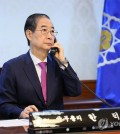- California Assembly OKs highest minimum wage in nation
- S. Korea unveils first graphic cigarette warnings
- US joins with South Korea, Japan in bid to deter North Korea
- LPGA golfer Chun In-gee finally back in action
- S. Korea won’t be top seed in final World Cup qualification round
- US men’s soccer misses 2nd straight Olympics
- US back on track in qualifying with 4-0 win over Guatemala
- High-intensity workout injuries spawn cottage industry
- CDC expands range of Zika mosquitoes into parts of Northeast
- Who knew? ‘The Walking Dead’ is helping families connect
Yoon declares emergency martial law; parliament votes to lift decree
President Yoon Suk Yeol declared emergency martial law, accusing the nation’s opposition of paralyzing the government with “anti-state activities,” but the National Assembly voted to lift the decree hours later.
“Martial law is aimed at eradicating pro-North Korean forces and to protect the constitutional order of freedom,” Yoon said in an emergency national address televised live in late Tuesday.
It marks the first declaration of emergency martial law in South Korea since 1979.
The surprise announcement came after the opposition Democratic Party (DP) railroaded a downsized budget bill in the parliamentary budget committee, and submitted impeachment motions against a state auditor and the chief prosecutor.
Under the Constitution, the president can declare martial law in response to military needs during times of war, armed conflict, a national emergency, or when public safety and order require it.
Following the address, Army Chief of Staff Gen. Park An-su, who was named as leader of martial law command, announced a decree banning all political activities, including protests and activities by political parties.
At at around 1 a.m, Wednesday, the 300-member National Assembly convened a plenary session to demand that Yoon lift martial law, with the resolution approved with 190 members present and 190 votes in favor.
With the motion’s passage, the martial law declaration is void, according to the parliamentary speaker’s office.
Under the Constitution, martial law must be lifted when a parliamentary majority demands it.
Yoon said the decision to declare martial law was aimed at “rebuilding and safeguarding” the nation, which he described as facing significant challenges.
While the declaration might cause “some inconvenience” to citizens, Yoon vowed to “normalize” the country swiftly, saying the government remains committed to its foreign policy of fulfilling its responsibilities within the international community.
Yoon highlighted that 22 impeachment motions have been filed against government officials since his inauguration in May 2022, with the opposition pursuing its 10th impeachment effort since the 22nd National Assembly convened in June.
He characterized the move as an “unprecedented” situation in the country’s history and in global politics, alleging that these actions have significantly hampered the executive branch’s function.
In regard to the downsized budget bill, Yoon said the reductions would undermine the government’s essential functions, including drug crime prevention and public safety measures, saying it has pushed the country toward becoming a “haven for drugs and left public safety in a state of crisis.”
Yoon accused the DP of using budget bills and impeachment motions as a political tool to shield DP leader Lee Jae-myung from prosecution, who is facing several trials.
“The National Assembly has become a haven for criminals, paralyzing the judicial and administrative systems and attempting to overthrow the free democratic system through legislative dictatorship,” he said.
Shortly after Yoon’s address, the DP urgently called in its lawmakers to the National Assembly. With 170 seats in the 300-member parliament, the DP has the capacity to revoke martial law with a majority vote.
Han Dong-hoon, leader of the ruling People Power Party, said Yoon’s declaration of martial law is “wrong” and that he will “block it” together with the people.
The United States said it is in contact with the South Korean government and monitoring the situation “closely.”
Deputy Secretary of State Kurt Campbell said the U.S. was watching events in South Korea with “grave concern” and had every hope and expectation that any political disputes would be resolved peacefully and in accordance with the rule of law.
“We’re seeking to engage our ROK counterparts at every level, both here and in Seoul, the president, the national security advisor, the secretary of state, have all been briefed on developments and are being kept appraised of the situation as it unfolds,” Campbell said, referring to Republic of Korea (ROK), South Korea’s official name.











